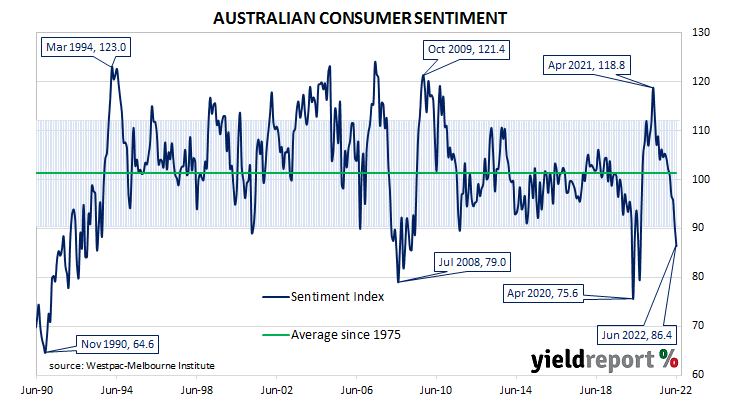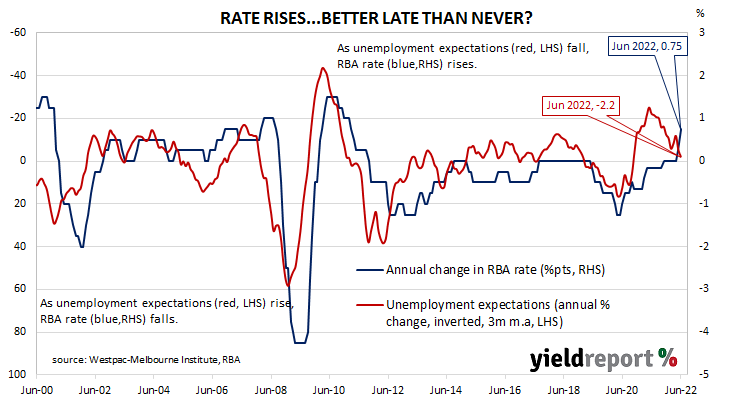Summary: Household sentiment deteriorates for seventh consecutive month in June; readings at/below this level only during major economic dislocations; driven by rising inflation, lifts in interest rates, loss of confidence around economic outlook; four of five sub-indices lower; respondents less concerned by prospects of unemployment.
After a lengthy divergence between measures of consumer sentiment and business confidence in Australia which began in 2014, confidence readings of the two sectors converged again in mid-July 2018. Both measures then deteriorated gradually in trend terms, with consumer confidence leading the way. Household sentiment fell off a cliff in April 2020 but, after a few months of to-ing and fro-ing, it then staged a full recovery. However, consumer sentiment has deteriorated significantly over the past year, while business sentiment has only deteriorated moderately.
According to the latest Westpac-Melbourne Institute survey conducted in the second week of June, household sentiment has deteriorated for a seventh consecutive month. Their Consumer Sentiment Index fell from May’s reading of 90.4 to 86.4, a reading which is below the range of “normal” readings and significantly lower than the long-term average reading of just over 101.
“This read is even weaker than we had expected,” said Westpac Chief Economist Bill Evans. ”Over the 46-year history of the survey, we have only seen Index reads at or below this level during major economic dislocations.”
Any reading of the Consumer Sentiment Index below 100 indicates the number of consumers who are pessimistic is greater than the number of consumers who are optimistic.
Domestic Treasury bond yields rose strongly on the day despite the figures. By the close of business, the 3-year ACGB yield had gained 16bps to 3.59% while 10-year and 20-year yields both finished 12bps higher at 4.08% and 4.27% respectively.
In the cash futures market, expectations of a steeper path for the actual cash rate over time became further entrenched. At the end of the day, contracts implied the cash rate would rise from the current rate of 0.81% to 1.325% in July and then increase to 1.96% by August. November contracts implied a 3.465% cash rate while May 2023 contracts implied 4.425%.
“The survey detail shows a clear picture of a slump in sentiment being driven by rising inflation, an associated lift in interest rates and a loss of confidence around the economic outlook, both here and abroad,” explained Evans.
Four of the five sub-indices registered lower readings, with the “Family finances – next 12 months” sub-index again posting the largest monthly percentage loss. The reading of the “Economic conditions – next 5 years” sub-index was the only one to increase.
The Unemployment Expectations index, formerly a useful guide to RBA rate changes, declined from 109.6 to 108.5. Lower readings result from fewer respondents expecting a higher unemployment rate in the year ahead.



